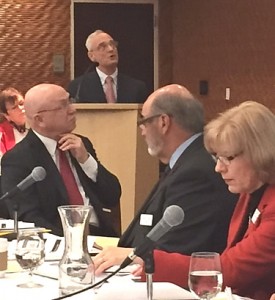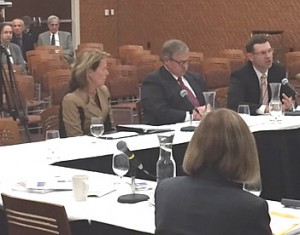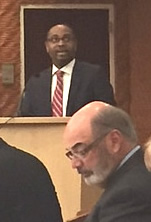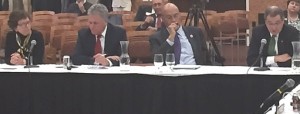MADISON – As the state’s largest developer of human potential, the University of Wisconsin System is in a unique position to help grow a stronger Wisconsin economy, President Ray Cross told the Board of Regents Thursday.
“We are part of the solution,” Cross said, adding that the UW System must “take the lead with our partners in the legislature and the private sector to do what is necessary to fully implement the Talent Development Initiative and address the challenges.”
The Talent Development Initiative, first introduced to the Board in August, is a vision for how the UW System can align its resources in three critical areas – the talent path, the talent infrastructure, and the talent-based economy – to better meet the current and future needs of the state’s employers.
- See the UW System news release
Wisconsin is facing an unprecedented “flattening” of its workforce in coming years as the state’s population becomes increasingly older, according to Todd Berry, president of the Wisconsin Taxpayers Alliance. Leading a presentation on demographic trends, Berry told Regents the result will be a smaller workforce that must increase its overall productivity for the state’s economy to grow.
“You can’t create jobs if you can’t put bodies in the jobs. If the working age population is going to be flat, we’re going to have some labor shortage issues,” Berry said.
The availability of talent “is consistently the No. 1 or 2 issue in every conversation we have with a company that has a long-term investment in our community,” said Todd Battle, president of the Kenosha Area Business Alliance, noting that concerns are being expressed over whether the talent pipeline can keep up with businesses’ demands and investments.
“The university is the talent pipeline, and it can be a magnet for bringing more people into our communities,” Battle said.
Battle was part of a business panel that also included Kathi Seifert, a former executive with the Kimberly-Clark Corporation and a current member of New North, Inc.; and Mark Tyler, founder and president of OEM Fabricators, Inc., a former president of the Wisconsin Technical College System Board, and a former member of the UW System Board of Regents.
Secretary Reggie Newson, of the state’s Department of Workforce Development (DWD), shared a report indicating that by 2030, more than half (51%) of all new and replacement jobs are projected to require at least an associate degree, with 41% requiring a bachelor degree or more. Currently, about one-third (36%) of working age adults in Wisconsin have at least an associate degree and one in four has a bachelor degree or higher. This mismatch in the talent pipeline must be addressed for Wisconsin’s economy to grow, Newson said.
“We need the alignment of workforce and economic development and education, pre- and post-secondary education, to the specific demands and needs of business and entrepreneurs in Wisconsin. We want to incentivize that behavior across the state,” Newson said.
Over the next decade, the DWD projects that the highest-demand occupations for degree-holders will be in healthcare, education, computer analysis, accounting, marketing, and managerial professions.
Berry pointed out the strong correlation between employment and the creation of new businesses, and the role that higher education can play in encouraging a culture that values risk-taking and innovation.
“The university shouldn’t be figuring out how to fill today’s jobs, but how to spawn tomorrow’s quirky thinkers who innovate, who will sometimes succeed and sometimes fail,” Berry said.
UW-Madison Chancellor Becky Blank, the former acting Secretary of Commerce, said that to succeed in today’s highly competitive economy, U.S. businesses must be nimble, innovate, and have new ideas. “That is what our institutions provide in terms of the people that businesses need to hire and, particularly for research universities, the ideas and the collaboration on innovation that they need.”
“We produce the people whose incomes are going up, who are necessarily the leaders who are going to create jobs, come up with new ideas, and lead the businesses that are going to be successful in this country in the future. That’s the main argument for what we do and why we’re so important,” Blank said.
Blank was part of a chancellor panel that included UW-Stout’s Bob Meyer, UW-Green Bay’s Gary Miller, and UW-Platteville’s Dennis Shields.
Governor’s message
Regent President Michael Falbo shared a message to the Board from Governor Scott Walker.
“I remain committed to working collaboratively to ensure we are effectively leveraging the UW System in our efforts to grow Wisconsin’s economy and create jobs,” Walker said in a statement. “I applaud your emphasis on workforce development and high impact talent, and I appreciate the partnership and vision that helped create the innovative UW Flex Option program.”
UW presents accountability reports
Regent President Falbo noted that this year marks the 20th anniversary of the UW System’s providing annual accountability reports. “The work we have done with Accountability Reporting over the years demonstrates that we are delivering on the significant investment that people make in higher education,” he said. “That commitment to transparency and accountability has never been more important.”
- Institutional reports as well as the UW System and UW-Madison Act 32 reports are available on the Reports & Statistics site.
David J. Ward, interim senior vice president for Academic and Student Affairs, led a presentation of the UW System’s overall report for 2013-14, including measures of student preparation, performance, engagement, and outcomes; some insight on faculty composition and productivity; and selected measures on program efficiency and productivity.
Ward told Regents that a systemwide accountability dashboard is expected to replace the current hard-copy reports next year.
Selected UW System highlights:
- UW System’s headcount enrollment in fall 2013 was 179,828
- Students of color increased from 8.9% of the total enrollment in fall 2004 to 13.6% of total enrollment in fall 2013
- The six-year graduation rate for fall 2007 UW new freshman entering full-time and graduating from the same UW institution was 59.3%, higher than the most recent national average of 57.2%
- UW institutions conferred 36,323 degrees at all levels in 2012-13, an increase from 35,708 in 2011-12 and 32,189 in 2003-04
- The number of UW degrees in the STEM fields increased from 6,893 in 2011-12 to 7,378 in 2012-13. UW degrees in health areas increased during the same period from 2,986 to 3,099. In 2012-13, STEM degrees represented 20.3% of all degrees conferred, and health degrees represented 8.5%
- Eighty-one percent of alumni who were Wisconsin residents when enrolled remained in Wisconsin after graduation. Overall, 67% of alumni remained in Wisconsin
- The proportion of bachelor’s degree recipients who studied abroad or were exchange students through a UW program as an undergraduate slightly increased from 13.9% (3,640 students) in 2011-112 to 14.0% (3,752) in 2012-13
- In 2013-14, the number of collaborative degree programs increased from 73 in the previous year to 82
Provost Sarah Mangelsdorf presented highlights from UW-Madison’s Act 32 Accountability Report. Selected highlights from her presentation include:
- The six-year graduation rate is 84.8%; the four-year rate is 57.0%
- Published in-state tuition and required fees is $10,410, lower than the Big 10 average of $11,931; total in-state cost of attendance is $24,222.
- Most popular majors are engineering, business, and biological and biomedical sciences
- 36% of graduates have participated in an undergraduate research experience, up from 19% a decade ago
In other business, the Regents:
- Heard a memorial tribute for former Regent President Emeritus Michael J. Spector, who recently passed away; and
- Approved UW-Oshkosh’s request for authority to exchange land with the City of Oshkosh. The exchange gives UW-Oshkosh improved access to a main thoroughfare for maintenance vehicles and more efficient physical plant operations, while also supporting the city’s project to improve its public works field operation facility.
Watch video webcast of Nov. 6, 2014, meeting
The University of Wisconsin System Board of Regents will next meet on December 4-5, 2014, at Van Hise Hall in Madison.




